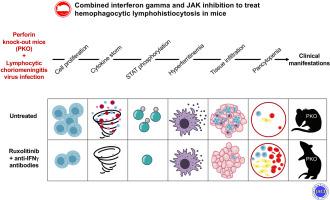Journal of Allergy and Clinical Immunology ( IF 14.2 ) Pub Date : 2022-08-13 , DOI: 10.1016/j.jaci.2022.07.026 Josée-Anne Joly 1 , Alexis Vallée 2 , Benoîte Bourdin 1 , Sara Bourbonnais 1 , Natalie Patey 3 , Louis Gaboury 4 , Yves Théorêt 5 , Hélène Decaluwe 6

|
Background
Familial hemophagocytic lymphohistiocytosis is a life-threatening hyperinflammatory disease caused by genetic defects in the granule-mediated cytotoxic pathway. Success of hematopoietic cell transplantation, the only cure, is correlated with the extent of disease control before transplantation. Unfortunately, disease refractoriness and toxicities to standard chemotherapy-based regimens are fatal in a fraction of patients. Novel targeted immunotherapies, such as IFN-γ blocking antibodies or ruxolitinib, a Janus kinase (JAK) 1/2 inhibitor, are promising but only partially effective at controlling disease.
Objective
We asked whether combinations of cytokine-targeted therapies, using antibodies or JAK inhibitor, work synergistically to counteract HLH.
Methods
Genetically predisposed mice were infected and treated with distinct combinations of immunotherapies. Disease outcome was monitored and compared to monotherapies.
Results
We showed that inhibiting IL-6 or IL-18 signaling in combination with IFN-γ blockade or ruxolitinib did not increase disease control compared to anti–IFN-γ antibodies or ruxolitinib monotherapies. In contrast, clinically relevant doses of ruxolitinib combined with low doses of anti–IFN-γ blocking antibodies corrected cytopenias, prevented overt neutrophilia, limited cytokinemia, and resolved HLH immunopathology and symptomatology.
Conclusions
Our findings demonstrate that IFN-γ blockade and ruxolitinib act synergistically to suppress HLH progression. This supports the use of combined cytokine-targeted therapies as a bridge to hematopoietic cell transplantation in severe familial hemophagocytic lymphohistiocytosis.
中文翻译:

联合 IFN-γ 和 JAK 抑制治疗小鼠噬血细胞性淋巴组织细胞增生症
背景
家族性噬血细胞性淋巴组织细胞增生症是一种危及生命的过度炎症性疾病,由颗粒介导的细胞毒途径中的遗传缺陷引起。造血细胞移植是唯一的治疗方法,其成功与移植前的疾病控制程度相关。不幸的是,对于一小部分患者来说,以标准化疗为基础的治疗方案的疾病难治性和毒性是致命的。新型靶向免疫疗法,如 IFN-γ 阻断抗体或 ruxolitinib,一种 Janus 激酶 (JAK) 1/2 抑制剂,很有前途,但在控制疾病方面仅部分有效。
客观的
我们询问使用抗体或 JAK 抑制剂的细胞因子靶向疗法的组合是否协同作用以抵消 HLH。
方法
遗传易感小鼠被感染并接受了不同的免疫疗法组合治疗。监测疾病结果并与单一疗法进行比较。
结果
我们表明,与抗 IFN-γ 抗体或 ruxolitinib 单一疗法相比,抑制 IL-6 或 IL-18 信号与 IFN-γ 阻断或 ruxolitinib 相结合并没有增加疾病控制。相比之下,临床相关剂量的鲁索替尼联合低剂量的抗-IFN-γ阻断抗体可纠正血细胞减少,预防明显的中性粒细胞增多、有限的细胞增多症,并解决 HLH 免疫病理学和症状学问题。
结论
我们的研究结果表明,IFN-γ 阻断剂和 ruxolitinib 协同作用以抑制 HLH 进展。这支持使用联合细胞因子靶向疗法作为造血细胞移植治疗严重家族性噬血细胞性淋巴组织细胞增生症的桥梁。



























 京公网安备 11010802027423号
京公网安备 11010802027423号